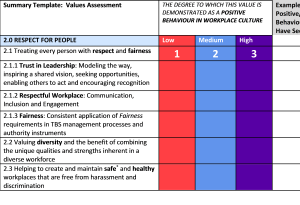Giving Voice to Values – Manager / Team Self-Assessment
“To have greater self-awareness or understanding means to have a better grasp of reality.” – Dalai Lama
Giving Voice to Values starts with self-awareness. So ask yourself as a manager or employee: What is working well? How well are people working together? Is anyone in need of support? Are there any areas of real or potential ethical risk in individuals, teams or the organization? To create and execute meaningful conversations and dialogue around values means examining your own and your organization’s circumstances. The goal is to foster an authentic environment that grants team members the permission to engage in conversations on how values and behaviors in their Code of Conduct are reflected in workplace culture.
Top level coaches in sport recognize that to ensure performance, they must listen to those they lead. They must self-assess themselves against standards – to achieve a sober realization of how their impact on the organization requires adjustment.
We worked with a department with international operations to create important tools for dialogue and self-assessment. These tools were designed to be easy to use and were based on determining from the Code of conduct whether the workplace exhibited either positive or negative behaviors. From this a Values-based Management Action Plan would be developed that promotes positive team interactions, but also ensures support or vigilance around ethical risks.
Finding meaning and enjoyment at work occurs through a personal decision to support the positivity and productivity of your team. Organization leaders, particularly top managers, are a significant factor in building support for and developing behaviors that are consistent with values-based management. Well-known axioms such as “Tone from the top” and Walking the talk” require empirical assessments of the effect of an organization’s senior leadership on the workplace.

